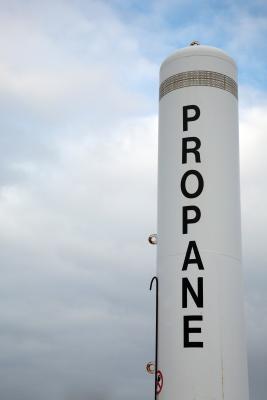
The average customer uses propane in two major environments. Vehicles are the first environment. Propane can run a vehicle by itself or in conjunction with gasoline or diesel fuel. The home is the second environment. Propane can heat water in the place of electricity and natural gas. The advantages and disadvantages of propane differ slightly depending upon the environment.
Propane used in vehicles is commonly called liquified petroleum gas. It adds fewer toxins to the air than other fuels and is less flammable. Additionally, 85 percent of propane comes from within the United States as opposed to the petroleum used to create gasoline and diesel, which is only 40 percent domestic.
As of 2011, the United States has not commercially produced a vehicle fitted to run on propane since 2004. A consumer can retrofit his vehicle, but it requires replacing the entire fuel system, including the fuel tanks, because propane requires high-pressure tanks. While propane costs less than gas, it is not readily available. The U.S. Energy Department reported in February 2010 that the United States had about 2,400 propane fueling stations. Although propane-powered vehicles maintain power and acceleration similar to that of gas-powered vehicles, propane offers slightly fewer miles to the gallon.
The Consumer Energy Center reports that propane is almost always less expensive than electricity when heating water for a hot water heater. Like electricity and natural gas, propane works with both tanked and tankless, also called “on-demand,” water heaters. Additionally, Swim University.com reports that a propane-fueled heater will heat a pool faster than almost any other type of heating system.
While propane-fueled water heaters generally cost less than electric heaters, they cost more than natural gas. According to the Consumer Energy Center, you could spend $150 to $250 more heating with propane than with natural gas. Although propane heats a pool quickly, this costs more than traditional pool-heating options. Swim University recommends this option only if you warm the pool only a few times a year, ideally for a short period of time.